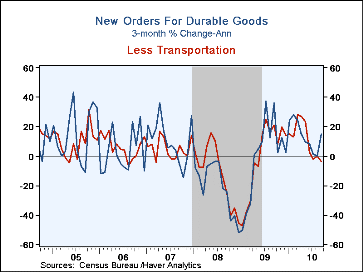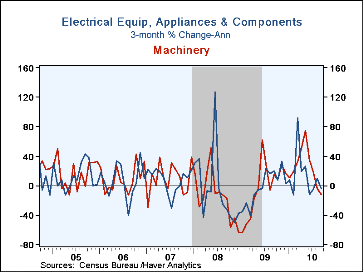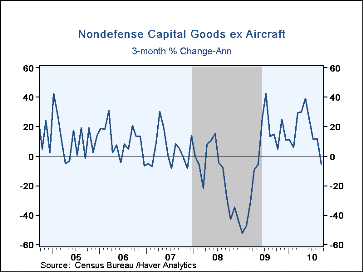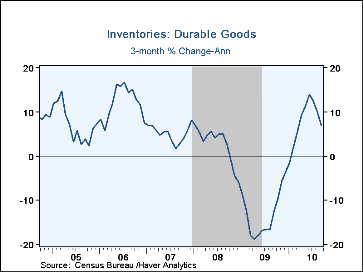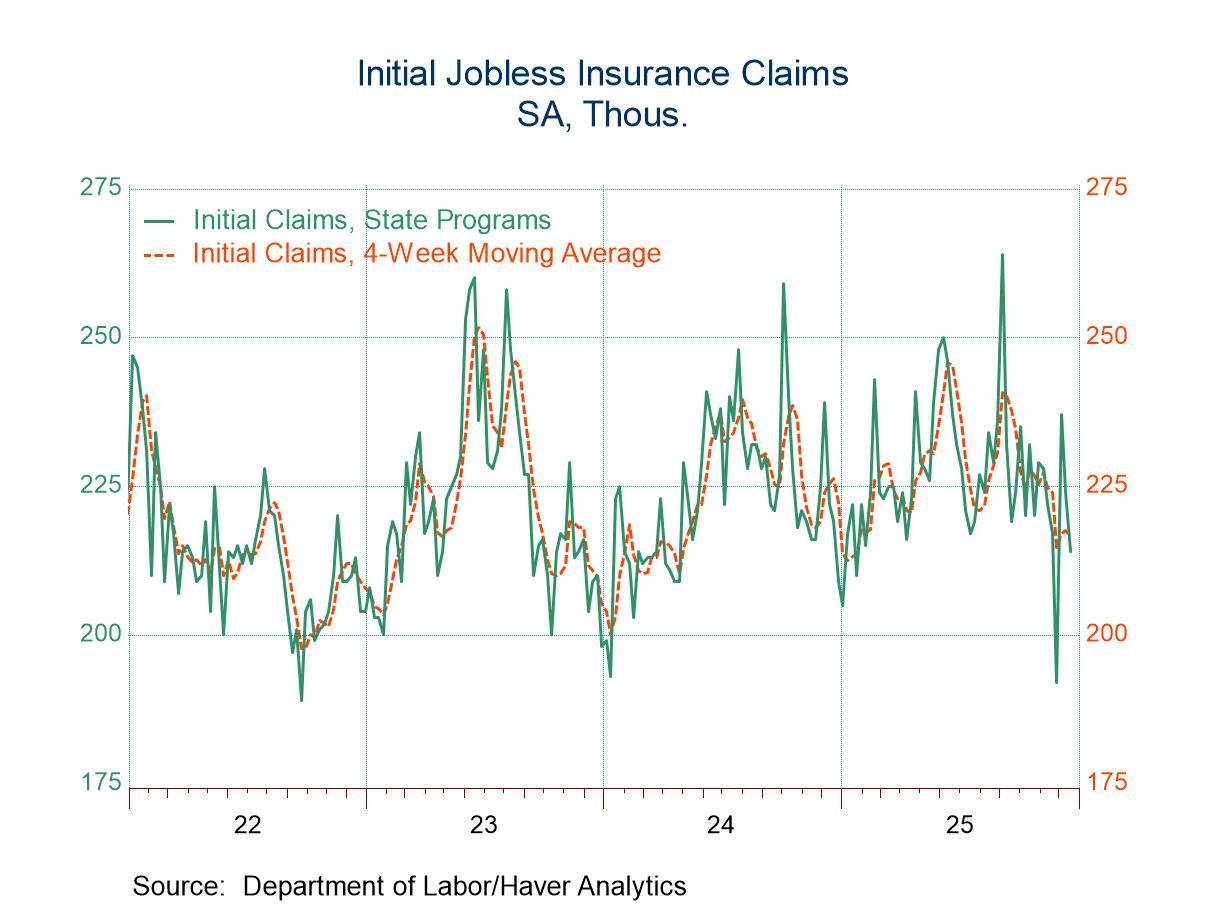 Global| Oct 27 2010
Global| Oct 27 2010U.S. Durable Goods Orders Soar With Higher Aircraft Bookings; Trend Weakens
by:Tom Moeller
|in:Economy in Brief
Summary
Be not misled by the headline figure. The underlying trend of durable orders has weakened substantially. The Commerce Department reported that September orders surged 3.3% following a 1.0% August decline that was slightly less than [...]
Be not misled by the headline figure. The underlying trend of durable orders has weakened substantially. The Commerce Department reported that September orders surged 3.3% following a 1.0% August decline that was slightly less than reported last month. A 2.0% orders increase was expected. On a three-month basis, orders rose at an improved 3.6% annual rate. However, volatility in aircraft once again distorted the underlying trend. Excluding the transportation sector overall, orders fell 0.8% versus a Consensus expectation for a 0.5% increase. The weakening trend is most evident in the three-month change in these orders which turned negative at a 3.9% rate.
To the upside were commercial aircraft & parts orders which more-than-doubled versus August and nearly tripled y/y. Also bucking the easing trend were September orders for computers & related products which rose 2.0% and 26.6% (AR) during the last three months. Elsewhere the trend in orders deteriorated. Though machinery orders rose 2.0% (16.3% y/y) and added to an August gain, it did not make up for a 9.8% July shortfall. Three-month growth turned sharply negative. Orders for communications equipment were notably weak and plunged 18.6% (-16.1% y/y). Electrical equipment orders ticked up 0.4% (13.7% y/y) but three-month growth was a negative 3.9%. (Earlier orders were revised up sharply.) Orders for motor vehicles slipped 0.4% (+6.1% y/y) and three-month growth also turned negative. Overall, the jump in aircraft lifted nondefense capital goods orders by 8.6% last month but excluding aircraft orders fell 0.6% and at a 5.4% annual rate since June.
Shipments of durable goods also have weakened. They fell 0.4% last month (+6.2% y/y) after a little-revised 1.4% August drop. Growth of 2.7% during the last three months was down from the recent 14-24% peaks. Excluding transportation, shipments slipped marginally last month (+10.5% y/y), but the three-month change also was a reduced 4.5%. (Again, revisions to earlier figures were positive.) Machinery shipments rose 1.5% but three-month growth of 6.4% was down from the 34.6% peak. Computer & electrical equipment shipments fell 2.3% but three-month growth held firm at 23.3%.
Weakened inventory accumulation continued behind some of the easing in orders & shipments. Durable goods inventories rose 0.5% (5.6% y/y) but that contrasted with 1.2% monthly increases this spring. The three-month growth eased to 7.1% from the 13.9% June high. Nevertheless, inventories remained roughly 10% below the late-2008 peak. Finally, backlogs of durable goods orders rose 1.0% during September and three-month growth strengthened to 4.7%.
The durable goods figures are available in Haver's USECON database.
Oh, the Places We'll Go: Three Scenarios for Economic Trajectory from the Federal Reserve Bank of Dallas can be found here here.
| NAICS Classification (%) | September | August | July | Y/Y | 2009 | 2008 | 2007 |
|---|---|---|---|---|---|---|---|
| Durable Goods Orders | 3.3 | -1.0 | 1.2 | 12.2 | -20.7 | -9.0 | 9.7 |
| Excluding Transportation | -0.8 | 1.9 | -2.1 | 9.5 | -18.4 | -2.5 | 4.5 |
| Nondefense Capital Goods | 8.6 | 1.0 | -0.7 | 27.1 | -26.8 | -12.6 | 17.5 |
| Excluding Aircraft | -0.6 | 4.8 | -5.3 | 13.9 | -19.8 | -4.2 | 5.3 |
Tom Moeller
AuthorMore in Author Profile »Prior to joining Haver Analytics in 2000, Mr. Moeller worked as the Economist at Chancellor Capital Management from 1985 to 1999. There, he developed comprehensive economic forecasts and interpreted economic data for equity and fixed income portfolio managers. Also at Chancellor, Mr. Moeller worked as an equity analyst and was responsible for researching and rating companies in the economically sensitive automobile and housing industries for investment in Chancellor’s equity portfolio. Prior to joining Chancellor, Mr. Moeller was an Economist at Citibank from 1979 to 1984. He also analyzed pricing behavior in the metals industry for the Council on Wage and Price Stability in Washington, D.C. In 1999, Mr. Moeller received the award for most accurate forecast from the Forecasters' Club of New York. From 1990 to 1992 he was President of the New York Association for Business Economists. Mr. Moeller earned an M.B.A. in Finance from Fordham University, where he graduated in 1987. He holds a Bachelor of Arts in Economics from George Washington University.


